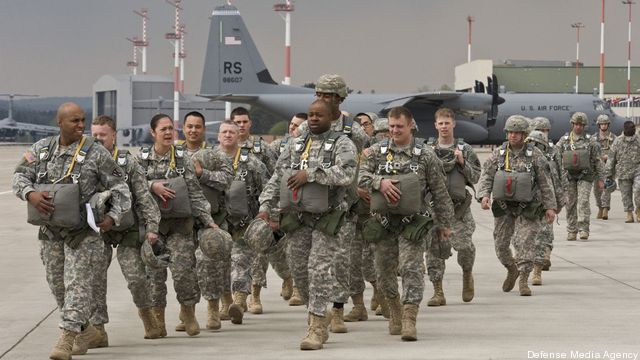As maritime security acquires greater salience in India’s foreign policy, New Delhi is increasingly looking to leverage its strategic partnerships, particularly with Paris. Although India and France have joined forces on a number of issues since 1998, regional cooperation in the Indo-Pacific has never risen to the top of the agenda. However, this may be about to change. In response to growing geopolitical turbulence and more aggressive maritime maneuvering, both Prime Minister Narendra Modi and President Emmanuel Macron appear eager to expand their strategic engagement. Since Macron’s election in 2017, a series of high-level discussions between New Delhi and Paris have focused on the prospects of a stronger maritime security partnership. Whatever the immediate motivation, the ramifications could be far reaching. Bolstering their alliance is bound to move India away from the legacy of nonalignment and military isolationism, pushing it progressively toward coalition building with other powers.
6 March 2018
India should focus on its defence preparedness
By D.C. PATHAK
The Brands That Kowtow to China
Funding Infrastructure: Why China Is Running Circles Around America
by Ellen Brown
 "One Belt, One Road," China's $1 trillion infrastructure initiative, is a massive undertaking of highways, pipelines, transmission lines, ports, power stations, fiber optics, and railroads connecting China to Central Asia, Europe and Africa. "It is the largest infrastructure project initiated by one nation in the history of the world and is designed to enable China to become the dominant economic power in the world."
"One Belt, One Road," China's $1 trillion infrastructure initiative, is a massive undertaking of highways, pipelines, transmission lines, ports, power stations, fiber optics, and railroads connecting China to Central Asia, Europe and Africa. "It is the largest infrastructure project initiated by one nation in the history of the world and is designed to enable China to become the dominant economic power in the world." Xi Jinping Extends Power, and China Braces for a New Cold War
By JANE PERLEZ
 BEIJING — Having cast aside presidential term limits, China is bracing for relations with the United States to enter a dangerous period under the continuing leadership of President Xi Jinping, intending to stand firm against President Trump and against policies it sees as attempts to contain its rise, according to Chinese analysts. Even before the announcement on Sunday that he could rule for the foreseeable future, Mr. Xi had ordered the Chinese military to counter the Pentagon with its own modernization in air, sea, space and cyber weapons, the analysts said, partly in response to Mr. Trump’s plans to revitalize American nuclear forces.
BEIJING — Having cast aside presidential term limits, China is bracing for relations with the United States to enter a dangerous period under the continuing leadership of President Xi Jinping, intending to stand firm against President Trump and against policies it sees as attempts to contain its rise, according to Chinese analysts. Even before the announcement on Sunday that he could rule for the foreseeable future, Mr. Xi had ordered the Chinese military to counter the Pentagon with its own modernization in air, sea, space and cyber weapons, the analysts said, partly in response to Mr. Trump’s plans to revitalize American nuclear forces.Beijing’s Vision for a Reshaped International Order
By Nadege Rolland
The “community of common destiny” (命运共同体) has emerged as one of Xi Jinping’s most favorite “diplospeak” phrases, appearing in his public speeches more than a hundred times since he first came to power in 2012. Far from a bland and well-meaning platitude, the “community” belongs to the realm of official political “formulations” (提法) that are meant to indicate the Party line. It reflects Beijing’s aspirations for a future world order, different from the existing one and more in line with its own interests and status.
Early Appearances and Concentric Circles of Expansion
China Anbang crackdown: Who might be next?
By Simon Atkinson
 Despite growing so big and borrowing so much, they were seen as untouchable because of their political connections. That was until the middle of last year when, after seemingly unrestrained growth, Beijing suddenly turned up the heat on some of those giants. And then last week, some real action. Beijing cracked down on one of those firms - taking control of insurance and financial giant Anbang, and prosecuting the firm's head.
Despite growing so big and borrowing so much, they were seen as untouchable because of their political connections. That was until the middle of last year when, after seemingly unrestrained growth, Beijing suddenly turned up the heat on some of those giants. And then last week, some real action. Beijing cracked down on one of those firms - taking control of insurance and financial giant Anbang, and prosecuting the firm's head.China’s leader, Xi Jinping, will be allowed to reign forever
 THE decision announced on February 25th to scrap term limits for China’s president, Xi Jinping, pierces the veil of Chinese politics. It reveals that, at a time when the ruling Communist Party is presenting China to the world as a modern, reliable and responsible state, capable of defending globalisation, the internal political system that the party monopolises is premodern, treacherous, inward-looking and brutal. It also shows that Chinese leaders’ own attempts to make the party otherwise have not got far.
THE decision announced on February 25th to scrap term limits for China’s president, Xi Jinping, pierces the veil of Chinese politics. It reveals that, at a time when the ruling Communist Party is presenting China to the world as a modern, reliable and responsible state, capable of defending globalisation, the internal political system that the party monopolises is premodern, treacherous, inward-looking and brutal. It also shows that Chinese leaders’ own attempts to make the party otherwise have not got far.How Civil Wars End
By Lise Howard and Alexandra Stark
 As with most civil wars, the war in Yemen is marked by the influence of outside actors. It began in September 2014, when the Iranian-backed Houthis took over the capital Sana’a, and it might well have ended six months later, when the president fled a Houthi advance on Aden. Instead, Saudi Arabia led a coalition of ten Arab countries—supported by the United States—in an air and ground campaign against the Houthis. Since then, the war has ground on, with a new dimension of fighting opening recently between southern secessionist militias—many of which receive support from the United Arab Emirates—and government forces backed by the Saudi coalition. Since taking office, the Trump administration has increased American air strikes in Yemen six fold.
As with most civil wars, the war in Yemen is marked by the influence of outside actors. It began in September 2014, when the Iranian-backed Houthis took over the capital Sana’a, and it might well have ended six months later, when the president fled a Houthi advance on Aden. Instead, Saudi Arabia led a coalition of ten Arab countries—supported by the United States—in an air and ground campaign against the Houthis. Since then, the war has ground on, with a new dimension of fighting opening recently between southern secessionist militias—many of which receive support from the United Arab Emirates—and government forces backed by the Saudi coalition. Since taking office, the Trump administration has increased American air strikes in Yemen six fold.Russian Meddling: A Highly Ordered Effort to Disorder U.S. Politics
The Russian effort raised trolling to a professional level of information warfare.
Russia's ongoing goal is destabilizing the U.S. electorate by amplifying political divisions.
Moscow's tactics can be mimicked by virtually anyone with a computer.
Russia is going rogue; the US must contain it
BY ANDERS ÅSLUND
 The U.S. indictment of the Internet Research Agency, or troll factory, in St. Petersburg on Feb. 16 has taken U.S.-Russian relations to a new nadir. The U.S. Department of Justice accuses the troll factory of a “conspiracy” that “had as its object impairing, obstructing and defeating the lawful governmental functions of the United States by dishonest means.” Although special counsel Robert Mueller has avoided implicating the Russian government, the Internet Research Agency obviously works for it. This must have consequences for U.S. policy on Russia.
The U.S. indictment of the Internet Research Agency, or troll factory, in St. Petersburg on Feb. 16 has taken U.S.-Russian relations to a new nadir. The U.S. Department of Justice accuses the troll factory of a “conspiracy” that “had as its object impairing, obstructing and defeating the lawful governmental functions of the United States by dishonest means.” Although special counsel Robert Mueller has avoided implicating the Russian government, the Internet Research Agency obviously works for it. This must have consequences for U.S. policy on Russia.Security Brief: McMaster on Thin Ice; Fighting Rages in Syria
BY ELIAS GROLL
 By Elias Groll, with Jenna McLaughlin and Bethany Allen-Ebrahimian McMassacre? With a CNN report Thursday that President Donald Trump may be on the verge of firing National Security Adviser Lt. General H.R. McMaster, the three-star Army general might be heading for a new position back in the military. McMaster has been the target of attacks. H.R. McMaster, national security advisor, listens as U.S. President Donald Trump meets with North Korean defectors in the Oval Office of the White House on February 2, 2018 in Washington, D.C.
By Elias Groll, with Jenna McLaughlin and Bethany Allen-Ebrahimian McMassacre? With a CNN report Thursday that President Donald Trump may be on the verge of firing National Security Adviser Lt. General H.R. McMaster, the three-star Army general might be heading for a new position back in the military. McMaster has been the target of attacks. H.R. McMaster, national security advisor, listens as U.S. President Donald Trump meets with North Korean defectors in the Oval Office of the White House on February 2, 2018 in Washington, D.C. America's "Chaos Strategy" in the Middle East and South Asia
By Anthony Cordesman
It does not take a great deal of vision to see that the United States has no clear strategy for any of the wars it is fighting in the Middle East and South Asia, and no clear strategy for dealing with any of the other strategic challenges in either region. The day-to-day focus of the media on some individual problem or event cannot disguise the fact that the U.S. makes decisions from day-to-day on a piecemeal basis. It lurches from issue to issue and high-level trip to trip. It wins tactical victories with no clear strategic impact or lasting impact on regional stability. It reacts in the short-term, and U.S. grand strategy is little more than the chaos dictated by external events.
Here Is How Israel's Military Dominates the Battlefield
T.S. Allen
 “God is not on the side of the big battalions,” the French philosopher Voltaire famously said, “but on the side of those who shoot best.” Today, the people of Israel take Voltaire’s idea that a covenant with God is maintained through military virtue seriously. They are surrounded by hostile states with significant military power, and their survival depends on their ability to counter military quantity with quality. In The Weapon Wizards: How Israel Became a High-Tech Military Superpower, Israeli journalists and Israeli Defense Forces (IDF) reservists Yaakov Katz and Amir Bohbot argue that the key to Israel’s success has been its innovative weapons programs, founded in advanced technology.
“God is not on the side of the big battalions,” the French philosopher Voltaire famously said, “but on the side of those who shoot best.” Today, the people of Israel take Voltaire’s idea that a covenant with God is maintained through military virtue seriously. They are surrounded by hostile states with significant military power, and their survival depends on their ability to counter military quantity with quality. In The Weapon Wizards: How Israel Became a High-Tech Military Superpower, Israeli journalists and Israeli Defense Forces (IDF) reservists Yaakov Katz and Amir Bohbot argue that the key to Israel’s success has been its innovative weapons programs, founded in advanced technology.The Myth of North Korea, the USS Pueblo, and Nuclear War
BY: MITCHELL LERNER
When the 50th anniversary of the capture of the USS Pueblo hit a few weeks ago, the nation’s eyes briefly returned to this forgotten American spy ship that had been captured in the East Sea in January 1968. For a few days, the internet was awash in stories related to this long-forgotten tragedy. Some described the terrible consequences for the 82 crewmen who were beaten and tortured for almost a year in DPRK prison camps.[1]Other articles attempted to draw lessons from the 1968 crisis that could be applied to today’s situation.[2]Others reminded readers that the DPRK still proudly held the ship, which has become a prominent tourist attraction.[3] But one fairly new and exciting theme in particular echoed across the social media landscape: the idea that the attack had come close to sparking a nuclear war.
We Are Still A Sitting Duck For Russian Hacking
Robert Kuttner
 When Russian President Vladimir Putin decided to use front organizations to leak confidential emails from the Hillary Clinton campaign and deploy bots and troll farms to rev up domestic hate groups and divide progressives, this was nothing less than an act of war. U.S. intelligence agencies have warned that additional attacks are coming in 2018 and 2020. But more than a year later, America’s response still leaves much to be desired.
When Russian President Vladimir Putin decided to use front organizations to leak confidential emails from the Hillary Clinton campaign and deploy bots and troll farms to rev up domestic hate groups and divide progressives, this was nothing less than an act of war. U.S. intelligence agencies have warned that additional attacks are coming in 2018 and 2020. But more than a year later, America’s response still leaves much to be desired. France's Advantage Over Germany
 Though Germany is currently Europe's largest country by population, demographic trends indicate that France will overtake its neighbor before 2060.
Though Germany is currently Europe's largest country by population, demographic trends indicate that France will overtake its neighbor before 2060.
While Berlin will experience changes due to a loss in population and aging, its current monetary policies will continue to provide a modicum of prosperity in the future.
The shift in influence from Berlin to Paris will not precipitate any conflict due to a recent history of closer reintegration and aging populations in both countries.
Why data science is simply the new astrology
Karthik Shashidhar
 It all started some six years ago, when I was in the middle of switching careers and thus had a fair bit of time on my hands. My wife Priyanka (who, incidentally, also writes a column for this website) suggested that I use this time to learn astrology. At the outset, I’d been taken aback, and found the suggestion bizarre; for I’ve never been religious or superstitious, or shown any sort of inclination to believe in astrology. Yes, there was this one time when I had helped set up a numerology stall for a school exhibition, but even that wasn’t particularly serious.
It all started some six years ago, when I was in the middle of switching careers and thus had a fair bit of time on my hands. My wife Priyanka (who, incidentally, also writes a column for this website) suggested that I use this time to learn astrology. At the outset, I’d been taken aback, and found the suggestion bizarre; for I’ve never been religious or superstitious, or shown any sort of inclination to believe in astrology. Yes, there was this one time when I had helped set up a numerology stall for a school exhibition, but even that wasn’t particularly serious. Silicon Valley and Washington Need to Learn to Work Together for Cybersecurity, Experts Say
Erin Mundahl
Is it time? Ending the Military’s Reliance on GPS
By Matt Sivacek
Global navigation satellite systems (GNSS), specifically satellite-based position, navigation and timing (PNT) constellations have been available for decades. The U.S. Department of Defense (DoD) started fielding the first GNSS, Global Positioning System (GPS), in 1973 to facilitate precision guidance for targeting and delivery of munitions. GPS has since moved well beyond military use, becoming a ubiquitous part of the global environment. Governments, people, economies, and infrastructures are all fully intertwined with satellite PNT. At the same time, military, economic, and scientific experts are aware of the Achilles Heel that will always plague the system – simple interference through jamming, spoofing or meaconing. Is it time for another navigation option?
How the Pentagon Devours the Budget
By William D. Hartung
Imagine for a moment a scheme in which American taxpayers were taken to the cleaners to the tune of hundreds of billions of dollars and there was barely a hint of criticism or outrage. Imagine as well that the White House and a majority of the politicians in Washington, no matter the party, acquiesced in the arrangement. In fact, the annual quest to boost Pentagon spending into the stratosphere regularly follows that very scenario, assisted by predictions of imminent doom from industry-funded hawks with a vested interest in increased military outlays.
THE MILITARY IS RELYING TOO HEAVILY ON SPECIAL OPS FORCES. MATTIS MUST END THAT.
 At a recent special operations symposium in Tampa, Florida—home of the U.S. Special Operations Command—a senior Marine commander said he was concerned that America was too often going to the special operations “well” to address its military challenges.
At a recent special operations symposium in Tampa, Florida—home of the U.S. Special Operations Command—a senior Marine commander said he was concerned that America was too often going to the special operations “well” to address its military challenges.
Unfortunately, he is correct.
Lt. Gen. William Beydler, the commander of Marine forces for all of the U.S. Central Command, America’s busiest war-fighting command, rightly noted that while the American people and leaders now have an enormous respect and fascination for units like the Navy SEALs, Army Green Berets, and Army Rangers, it might be leading the nation to neglect other capabilities.
The False Assumptions Fueling America’s Endless War
by Erik Goepner
America’s war on terror has now entered its seventeenth year. The U.S. has invaded Afghanistan and Iraq and conducted military operations in Pakistan, Syria, Yemen, Somalia, Libya, and the Philippines. More recently, four military members died in Niger during an ambush, suggesting the war on terror continues to widen. The war has cost the lives of nearly 7,000 service members and between $1.8 and $4 trillion. Despite the heavy toll in blood and treasure, most Americans seem content for the war to continue. Polling indicates 70 percent of Americans believe an attack that will kill “large numbers of lives” is somewhat or very likely in the near future, just under six in ten say Islamic fundamentalism is a critical and enduring threat to the country, and 41 percent think the U.S. is winning the war (as opposed to 17 percent who think the terrorists are).1
Military Force Structure: Trade-Offs, Trade-Offs, Trade-Offs
By MARK CANCIAN
 Mark Cancian, a member of the Breaking Defense Board of Contributors, knows budgets. He used to help build the defense budget at the Office of Management and Budget, the largely unheralded center of federal fiscal power. So when he picks apart the budget deal Congress recently approved (or any other one) you should pay attention. He’s doing it right here in this op-ed written for the Center for Strategic and International Studies, so read on! The Editor
Mark Cancian, a member of the Breaking Defense Board of Contributors, knows budgets. He used to help build the defense budget at the Office of Management and Budget, the largely unheralded center of federal fiscal power. So when he picks apart the budget deal Congress recently approved (or any other one) you should pay attention. He’s doing it right here in this op-ed written for the Center for Strategic and International Studies, so read on! The EditorNarrative Warfare
By Ajit Maan
“…the opportunity of defeating the enemy is provided by the enemy himself.” Sun Tzu (544-496 BC)
While the art of non-kinetic warfare is as old as the hills, the alacrity and multi-dimensional strategy of the attacks generated by adversaries of the U.S. and her allies to create psychological susceptibility to narratives that have been weaponized is new.
Our superior conventional kinetic capacity has promoted the recourse of our adversaries to irregular, often indirect, forms of conflict. And while our superior military can, in some cases, prevent the escalation of hostilities to direct modes of confrontation, it may be counter-productive in the influence wars we are in now if the kinetics do not serve a narrative strategy.
Subscribe to:
Comments (Atom)
